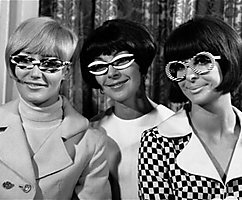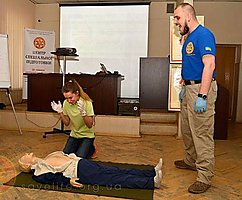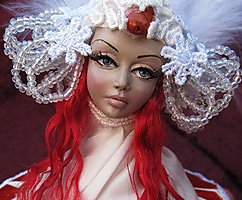Why do not "own fault" OR TRAVEL IN STYLE NEW AGE
 Bashny.Net
Bashny.Net
We are sad to look at the crowd, walking under the flag of "own fault", "drew him to her misfortune," "it is your karma." If you are with us at the same time, let us, as opposed to the prosecutors to share this article psychologist Julie Ingram.

One of my friends got sick. She was a parishioner of fashionable sect and tried to ask for a little financial help from his guru. Instead of support, he offered her spiritual mentor to reflect on the "lessons" that teaches her illness. The woman barely crawled home and fell into bed exhausted.
For 36 years the therapist I saw a lot of customers who are victims of people like this guru. That's what they usually say to people in distress:
Do not worry, because everything in life is not accidental
No one can hurt you without your consent
I wonder what you have let yourself get sick this?
It's just your karma
Accidents do not happen
We are to blame for everything that happens to us
I call this attitude "bullying style New Age" (New Age is the common name of a group of different occult movements that emerged in the 70s of XX century. Translator's note).
I first used this expression once went to a lecture by the 90th of the next guru. He told us how we "create our own reality." One of his listeners shared with us how she taught her daughter to ride a bike. When the little girl fell and scraped her knee, her mother did not comfort her. She told the child to sit down and think about how it formed the event your thoughts. To my horror all applauded this story. Guru believes that children need to understand: everything bad happens to them only through their own fault.
Is guilty
Of course, the belief that we influence our reality can be for some people is very inspiring. My customers are firmly convinced of the fact that they are responsible for what happens in their lives, are better at recovering from trauma than those who are stuck in the cycle of shame / guilt (for themselves or for others). But this is not a universal remedy.
A friend of mine, Gen Kelsang, ill leukemia. In search of an answer to the question of how this is possible, it has come to Buddhism. Faith calmed her more, her illness has receded. Gene believes that her life is totally dependent on her karma. But she never insisted on it when Buddhism teaches in groups for cancer patients: "I do not know whether they believe in it, participants", - she told me: "So to talk about it would be inappropriate".
Held its border is very important. Finding personal faith - is a process. If you, for example, only began to recover after experiencing violence, the first stage of the work is to overcome the popular belief "my fault." This belief does not make you stronger. In my therapy practice, I have not met anyone who would not pass through a phase of self-blame. Often, all that have the strength to customers in the early stages of operation, is to understand what is to blame for the violence, in fact, a rapist.
Tell a vulnerable client, we are all blacksmiths his happiness, and you drown it in the guilt.
Consultants working in shelters for women victims of domestic violence or rape victims, know what a long and stressful process for their clients - to restore a sense of power over their lives. It will be very severely tortured a woman to ask what she was guilty.
I encourage clients to think carefully about the conviction according to which the need to maintain a relationship or a bad hard work, because "there are lessons to be learned" or "this is karma." Perhaps at this point you herbs themselves.
Why say so?
People often act out of a sincere desire to help. But they are wrong. For example, in terms of Buddhism, we can not know in advance what will be the results of our actions, nor remember exactly which actions in the past given rise to such an outcome. Therefore, if someone answers your experiences phrase "It's just such karma", then he lacks empathy and he is not very versed in karma.
From the perspective of psychology, there is another reason for blaming the victim. Vicky Sharpe, an expert in dealing with victims, explains: "People tend to blame the victims, because it makes them feel less vulnerable and more controlling. They reason: here's a woman one night left the window open, the man climbed into the house and raped her. She was raped because she did something wrong. She left the window open, but I do not do that, then I am safe ".
Whatever it was, so to speak loud would mean giving unsolicited advice.
Perhaps we could all learn from the Buddha, who allegedly told about the beliefs of the following:
"Do not believe anything because it said the sage. Do not believe anything because it's so accepted. Do not believe anything because it is written. Do not believe anything because they say that it is Divine. Do not believe anything because it believes someone else. Believe only what you yourself are accurate ".
Julia Ingram

One of my friends got sick. She was a parishioner of fashionable sect and tried to ask for a little financial help from his guru. Instead of support, he offered her spiritual mentor to reflect on the "lessons" that teaches her illness. The woman barely crawled home and fell into bed exhausted.
For 36 years the therapist I saw a lot of customers who are victims of people like this guru. That's what they usually say to people in distress:
Do not worry, because everything in life is not accidental
No one can hurt you without your consent
I wonder what you have let yourself get sick this?
It's just your karma
Accidents do not happen
We are to blame for everything that happens to us
I call this attitude "bullying style New Age" (New Age is the common name of a group of different occult movements that emerged in the 70s of XX century. Translator's note).
I first used this expression once went to a lecture by the 90th of the next guru. He told us how we "create our own reality." One of his listeners shared with us how she taught her daughter to ride a bike. When the little girl fell and scraped her knee, her mother did not comfort her. She told the child to sit down and think about how it formed the event your thoughts. To my horror all applauded this story. Guru believes that children need to understand: everything bad happens to them only through their own fault.
Is guilty
Of course, the belief that we influence our reality can be for some people is very inspiring. My customers are firmly convinced of the fact that they are responsible for what happens in their lives, are better at recovering from trauma than those who are stuck in the cycle of shame / guilt (for themselves or for others). But this is not a universal remedy.
A friend of mine, Gen Kelsang, ill leukemia. In search of an answer to the question of how this is possible, it has come to Buddhism. Faith calmed her more, her illness has receded. Gene believes that her life is totally dependent on her karma. But she never insisted on it when Buddhism teaches in groups for cancer patients: "I do not know whether they believe in it, participants", - she told me: "So to talk about it would be inappropriate".
Held its border is very important. Finding personal faith - is a process. If you, for example, only began to recover after experiencing violence, the first stage of the work is to overcome the popular belief "my fault." This belief does not make you stronger. In my therapy practice, I have not met anyone who would not pass through a phase of self-blame. Often, all that have the strength to customers in the early stages of operation, is to understand what is to blame for the violence, in fact, a rapist.
Tell a vulnerable client, we are all blacksmiths his happiness, and you drown it in the guilt.
Consultants working in shelters for women victims of domestic violence or rape victims, know what a long and stressful process for their clients - to restore a sense of power over their lives. It will be very severely tortured a woman to ask what she was guilty.
I encourage clients to think carefully about the conviction according to which the need to maintain a relationship or a bad hard work, because "there are lessons to be learned" or "this is karma." Perhaps at this point you herbs themselves.
Why say so?
People often act out of a sincere desire to help. But they are wrong. For example, in terms of Buddhism, we can not know in advance what will be the results of our actions, nor remember exactly which actions in the past given rise to such an outcome. Therefore, if someone answers your experiences phrase "It's just such karma", then he lacks empathy and he is not very versed in karma.
From the perspective of psychology, there is another reason for blaming the victim. Vicky Sharpe, an expert in dealing with victims, explains: "People tend to blame the victims, because it makes them feel less vulnerable and more controlling. They reason: here's a woman one night left the window open, the man climbed into the house and raped her. She was raped because she did something wrong. She left the window open, but I do not do that, then I am safe ".
Whatever it was, so to speak loud would mean giving unsolicited advice.
Perhaps we could all learn from the Buddha, who allegedly told about the beliefs of the following:
"Do not believe anything because it said the sage. Do not believe anything because it's so accepted. Do not believe anything because it is written. Do not believe anything because they say that it is Divine. Do not believe anything because it believes someone else. Believe only what you yourself are accurate ".
Julia Ingram
Tags
See also
What is the purpose of your relationship with a man
The life of a cat.
Nine Lives Barsika
Relations need to learn
HOW TO LOVE MEN
Do not put man at the center of his universe
Why is one woman a man wants to be, but the other runs
When he really did not "pull" or How strong the woman is to build relationships
Relationships need to learn
A number of us is always that the man we deserve

















